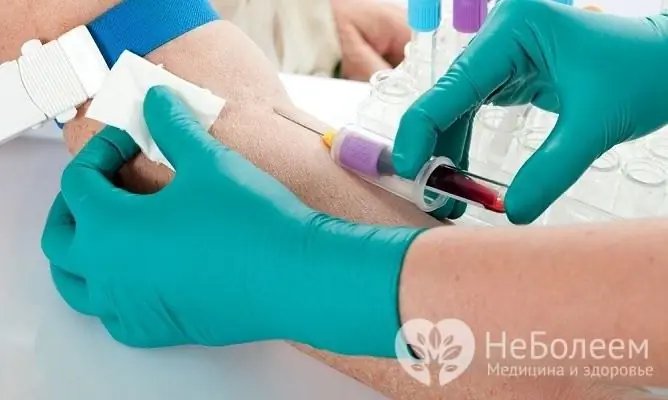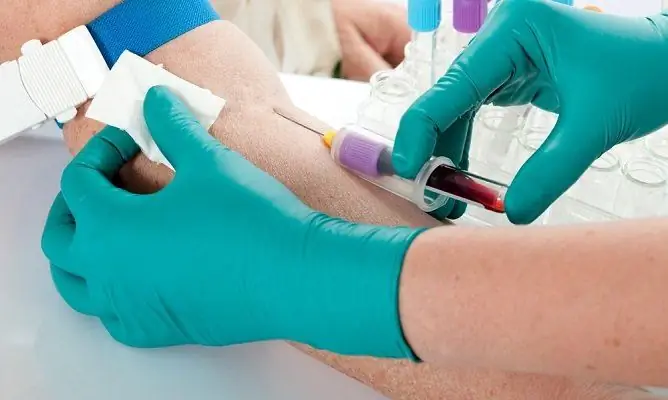Analysis for vitamin D: what is it for and how to take it?
The content of the article:
- Who needs to be tested for vitamin D and in what cases?
- How to donate blood for analysis
- Decoding of research results
- Reasons for deviations from the norm
- Function of vitamin D in the body
Vitamin D, as a whole group of substances with the same action is called, are biologically active compounds that perform functions in the body that are close to hormonal ones. Vitamin participates in the metabolism of calcium, phosphorus and magnesium, regulates the level of calcium in the blood and plays an important role in the formation of bone tissue.

For analysis for vitamin D, blood is taken from a vein on an empty stomach
It enters the body in two forms - ergocalciferol (vitamin D 2) and cholecalciferol (vitamin D 3). Different forms of vitamin D enter the body from different sources. Cholecalciferol is formed in human skin when exposed to sunlight and enters the body with food. Ergocalciferol can only be taken with food. Vitamin D is rich in fatty dairy products, beef liver, egg yolks, fish, fish oil.
After the vitamin enters the body in the liver, the OH-group in the 25th position is attached to it, an active metabolite 25-OH is formed. Then, in the kidneys, a second OH group joins in the 1st position with the formation of calcitriol (1,25-dihydroxycalferol), which ensures the flow of calcium into the blood.
In the course of a blood test, the concentration of not vitamin D itself is usually determined, but its metabolite - 25-OH vitamin D. It is he who is an indicator reflecting the status of vitamin D in the body.
Who needs to be tested for vitamin D and in what cases?
As a rule, a vitamin D test is prescribed by a physician, endocrinologist, or orthopedist. The indications for him may be:
- growth disorders;
- diseases associated with hypocalcemia and hypophosphatemia (rickets, osteoporosis, osteopenia);
- bone deformation;
- osteomalacia;
- fibrocystic osteitis;
- ossalgia (bone pain);
- refraction (repeated bone fracture);
- detection of normal or decreased calcium simultaneously with an increase in parathyroid hormone levels;
- diseases and conditions associated with malabsorption syndrome (radiation enteritis, severe liver failure, celiac disease, Crohn's disease, Whipple's disease, celiac disease);
- chronic pancreatitis with secretory insufficiency;
- chronic gastritis with achlorhydria;
- arthritis;
- hemorrhagic diathesis;
- lupus erythematosus with predominant skin lesions;
- osteoarticular tuberculosis;
- renal osteodystrophy;
- tetany caused by dysfunction of the parathyroid glands;
- planning of arthroplasty;
- dental implantation.
In addition, a vitamin D test is prescribed in the course of treatment with medications containing vitamin D and calcium in order to assess the correctness of treatment and adjust the dosage in time.
A blood test for vitamin D is also recommended for people who have to constantly be in closed rooms and are deprived of exposure to sunlight on the skin - for example, bedridden patients, patients with photodermatitis.
How to donate blood for analysis
The main method for studying the content of vitamin D in the body is the determination of the level of 25 (OH) D, which makes it possible to determine both main forms of vitamin D in one study.
Blood for research is taken from a vein through a vacuum system. No special preparation is required, it is enough to adhere to the generally accepted rules for taking tests: blood sampling in the morning on an empty stomach, the optimal time between donating blood and the last meal is 8-14 hours, you cannot drink coffee or tea before donating blood, you can drink water.
If you suspect a vitamin D deficiency, the examination should include other laboratory methods: determination of calcium and phosphorus in the blood (with a pronounced deficiency, the analysis will show a decrease in these indicators), parathyroid hormone, studies for the level of urea, creatinine, magnesium.
Decoding of research results
Vitamin D level meaning:
- below 10 ng / ml - a pronounced deficiency;
- from 10 to 20 ng / ml - moderate deficiency;
- from 20 to 30 ng / ml - failure;
- from 30 to 100 ng / ml - the norm;
- above 150 ng / ml - hypervitaminosis, toxic effect is possible.
Rates may vary from laboratory to laboratory and depend on units of measurement.
An increase in vitamin levels is noted with hypervitaminosis, disodium etidronate intake or excessive exposure to sunlight.
Vitamin deficiency can indicate digestive and absorption disorders, inflammatory bowel disease, steatorrhea, liver disease, pancreatic insufficiency, rickets, celiac disease, Alzheimer's disease, chronic renal failure, pathologies of the parathyroid and thyroid glands.
Only a doctor can decipher the correct analysis for vitamin D, as well as make a diagnosis, taking into account this and other laboratory studies, data of instrumental diagnostics and clinical picture.
Reasons for deviations from the norm
Vitamin D deficiency can be caused by its insufficient content in food, lack of insolation, pathology of the digestive system and genetic diseases. Often, low vitamin D levels indicate malabsorption, such as bowel disease. Other possible reasons:
- violation of the formation of the active form of the vitamin in the kidneys in chronic renal failure and impaired renal function;
- changes in the level of parathyroid hormone, which stimulates the formation of the active form of vitamin D;
- large loss of protein-bound vitamin D in the urine in nephrotic syndrome;
- the use of drugs that reduce the absorption of cholesterol;
- liver pathologies accompanied by a decrease in the formation of 25 (OH) D from precursors;
- decreased production of vitamin D in the skin;
- inherited forms of vitamin D resistance.
Function of vitamin D in the body
The main functions of the vitamin are to ensure the growth and development of bone tissue, the regulation of mineral metabolism, and the prevention of bone demineralization. Vitamin D stimulates the absorption of calcium compounds, promotes the deposition of calcium in bone tissue and dentin.

Vitamin D is produced in the body when exposed to sunlight and also comes from food
Due to its participation in mineral metabolism, vitamin D has the following effects in the body:
- increases immunity, participates in the regulation of the immune system, reduces susceptibility to infections;
- reduces the concentration of blood cholesterol;
- inhibits the growth of cancer and cells, reduces the risk of developing colon and stomach cancer, leukemia, breast cancer, ovarian cancer, brain, prostate cancer;
- slows down the development of age-related disorders;
- regulates blood pressure and heart rate;
- reduces the risk of developing tumors of the parathyroid glands.
Low levels of vitamin D create preconditions for the development of many diseases, in particular those based on an autoimmune component: diabetes mellitus, autoimmune thyroiditis, multiple multiple sclerosis, Crohn's disease, rheumatoid arthritis, systemic lupus erythematosus. In addition, the risk of developing cardiovascular and oncological pathologies increases.
YouTube video related to the article:

Anna Kozlova Medical journalist About the author
Education: Rostov State Medical University, specialty "General Medicine".
Found a mistake in the text? Select it and press Ctrl + Enter.







